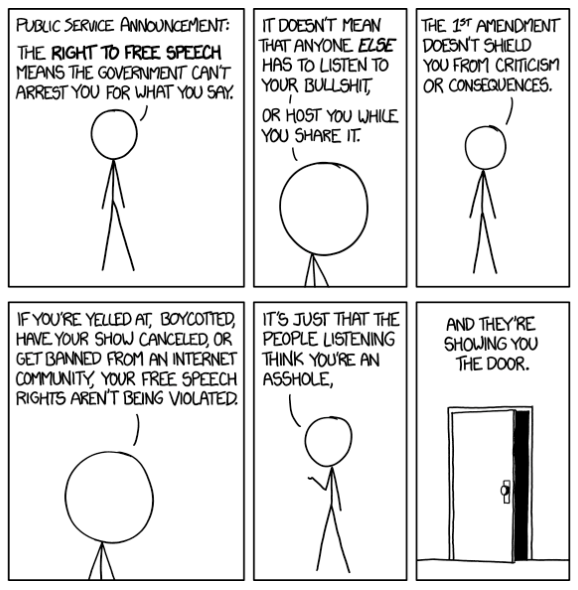Richard hates the cloud.

Richard hates the cloud.

Companies aren’t actually bound by the first amendment, they can censor or silence anything they want on their property/platform all they want. Not the best for PR but perfectly legal
Other people can do the same BTW, protection from censorship and allowing free speech only applies to the government/government bodies
Also fun fact is companies are essentially people from a rights standpoint and they have the same rights as any one person
Technically i guess you may be right and it even makes some sense, today i’ve read a lot of legal arguments for / against similar cases, still it’s…a little bit insane when it comes to cases like social-media or e-mail marketing (by one of the leading companies in sphere, i worked with a lot of people who’ve used it), hope they’ll burn by backlash and people / businesses will become more conscious of FOSS and decentralization solutions for such important stuff - really bad practice and very “weird” timing.
Not really a legal argument to be had tbh, its probably not a good move business wise but they’re telling you and are 100% in their right to do so.
It’d be like someone suing you because you said they can’t swear in your house.
They better have some solid proof! ![]()
Big tech this days ain’t much better than extra-territorial government over-watching world ![]()
There is, at least in the US. If the platform in question is primarily a communications platform there are some circumstances in which censoring certain communication can fall afoul of the first amendment and potentially other communication acts. Of course, like everything, the law is hopelessly complicated and open to interpretation and I have no idea if this situation qualifies.

Pretty accurate description of how real dangerous fringe lunatics of our society got born in that door of echo-chamber 
So many good old pitchforks to step on, fascinating 
I’m pretty positive you wouldn’t be able to make a first amendment cases it doesn’t apply to companies or their social platform, etc.
You may be able to make a discrimination case based on how aggressively and what they censored you for though. Google has had this sort of trouble with censorship and the best means to combat it is discrimination claims if you can provide enough evidence
First, I am in no way qualified to have this argument but isn’t that essentially the argument a judge took recently against shutting down tiktok?
Maybe? I haven’t kept up on tiktok so Id have to look into it
Even IRL.
For example freedom of Speech does not apply in Malls, only on public streets. Start a demonstration inside a mall, and they have the right to literally throw you out.
I think the core argument is around if there is a line past which companies don’t get to decide what speech is or isn’t allowed on their platform.
Though I do think that all of the major social media platforms are complete cancer and unashamed echo chambers, I’m not sure forcing them to allow all legal speech is a good idea either.
If social media platforms are free to censor speech they disagree with, then they are not a platform, but a publisher, so they should not get the protection under the Section 230 of the CDA, and should be liable to be sued for the content on their pages.
A publication like a magazine is free to choose what to publish and what to refuse to publish (censor). However, if a magazine publishes an article that is libellous, not only the author, but the magazine can also be sued by the wronged party. In other words, publishers are responsible for the content they publish (and, of course, libel, threats and other criminal activities are not protected under the First Amendment).
On the other hand, I can tweet something libellous, and while I can be sued for that, Twitter cannot, because Twitter is not a publisher, but a platform. Just like a telephone company cannot be sued for what I say over a telephone conversation, even if I’m committing a crime, like fraud. But in that case, Twitter should not have the right to decide what can be posted and what not on their platform, just like a telephone company has no right to decide what words can be used in a telephone conversation.
But Twitter wants to have it both ways: all the power of a publisher, but no responsibility for the content. They should not be allowed to get away with that, their privileges under the Section 230 of CDA should be revoked, and people who are wronged by them should sue them into oblivion.
I don’t agree on the basis of social media companies don’t present themselves as some type of news organization. Users are not hired or contracted to write content for them and I don’t think it’s the right way to go about it as if they are. It’s all a matter of what they actually are, not what we view them to be.
It’s up to Twitter to decide what they are, a publisher or a free-speech platform.
Either they are free to decide what gets published on their websites, in which case they are not protected by Section 230, or they are a free-speech platform which is not responsible for the content their users publish, in which case Section 230 protects them, but they have no right to decide what is allowed speech and what isn’t (unless it is criminal under the law, in which case they have to remove it, but cannot be held liable for it).
Here is a nice article by EFF about Section 230 of CDA:
Not trying to be antagonistic here, but where does the law state that? I’m not seeing it.
The EFF article doesn’t go into what would make someone unprotected by Section 230, either.
That’s how it work in Sweden.